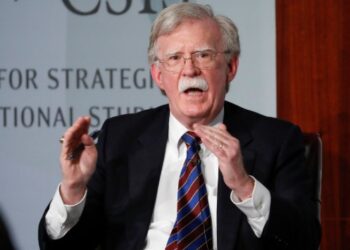In a riveting discussion between Jim Rickards and Peter Navarro on Friday’s WarRoom, the financial strategist laid out a compelling argument for why the U.S. should return to the economic principles that shaped the nation’s prosperity, particularly advocating for policies reminiscent of Donald Trump’s administration.
Rickards, a well-regarded financial analyst known for his newsletter Strategic Intelligence, focused on the historical and contemporary economic landscape, drawing parallels between past and present to illustrate his points.
In the WarRoom segment, Rickards began by contrasting two fundamental economic ideologies: the American System and globalist neoliberalism.
“The American System, as articulated by Hamilton and embraced by leaders like Trump, emphasizes tariffs, infrastructure, and a strong national defense to build domestic industries and secure American jobs. In contrast, globalist neoliberalism prioritizes international agreements and compromises, often at the expense of domestic prosperity and economic independence,” Rickards told Navarro.
He praised the American System—rooted in the strategies of historical figures like Alexander Hamilton, Andrew Jackson, and George Washington—for its emphasis on tariffs, infrastructure investment, strong national defense, and a national bank.
Rickards states these principles are crucial for economic strength and job creation. He remarked, "The American System, as articulated by Hamilton and later adopted by leaders like Reagan and Trump, is centered on building domestic industries and safeguarding American jobs through strategic tariffs and infrastructure investments.”
Hamilton’s vision, which included protective tariffs to encourage domestic manufacturing, was seen as pivotal for the early economic development of the United States. Jackson’s commitment to keeping government spending focused on national interests and Washington’s foundational role in establishing a robust economic system laid the groundwork for American prosperity. Rickards believes that modern policies echoing these historical approaches are essential to counteract the detrimental effects of globalist neoliberalism, which he associates with recent Democratic administrations.
Rickards was particularly critical of the Biden-Harris administration’s energy policies, which he argued have weakened America’s strategic economic position. He pointed out that while the Trump administration’s policies successfully reduced oil prices and bolstered U.S. energy dominance, the current administration’s failure to open up domestic oil production has allowed oil prices to remain high, indirectly supporting Russia’s war efforts. "If you really want to defeat Russia,” Rickards asserted, "you have to get oil prices down to $40 a barrel. That means drilling, building infrastructure like the Keystone Pipeline, and leveraging U.S. energy dominance.”
Rickards emphasized that the Trump administration’s energy policies were not merely about economic gain but also about strategic positioning. By fostering energy independence and controlling global oil prices, the U.S. could effectively weaken adversaries and strengthen its own economic standing. He argued, "The Trump administration’s approach was about more than just economic growth; it was about using energy policy as a strategic tool to enhance national security and economic stability.”
In contrast, Rickards criticized the current Biden-Harris administration’s approach as both economically naive and strategically flawed. He suggested that the globalist neoliberal policies prioritizing international agreements and compromises have led to missed opportunities for strengthening the American economy and securing jobs. "The policies of the current administration are reminiscent of the globalist approach—prioritizing international commitments over domestic prosperity,” Rickards noted.
Rickards advocates for a return to the economic strategies that have historically proven successful for the U.S., emphasizing the importance of policies that bolster domestic industries, create American jobs, and leverage energy production as a strategic asset.
His analysis underscores a belief that embracing the principles of Hamilton, Jackson, and Washington can guide the nation toward greater economic and strategic success.
For more from Jim Rickards, watch the full WarRoom segment:





